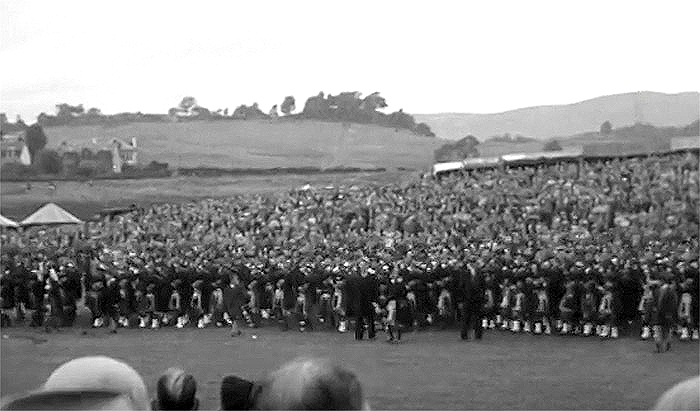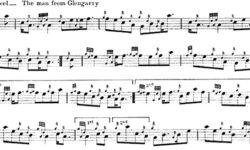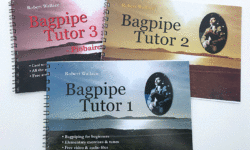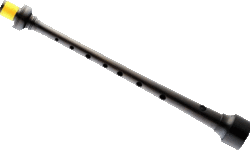We continue with our look back at the history of the RSPBA. This is from the Piping, Drumming and Highland Dancing Journal of 1949. The author, Mr RC Whitelaw, was appointed Secretary of the then Scottish Pipe Band Association in 1948. Mr Whitelaw was refreshingly outspoken in his assessment on how the Association needed to develop. The photo below is of the massed bands at Cowal in 1950.

Before passing to the second major problem, let me offer a few words of criticism on this massed pipe band complex. Surely it is possible for a more sensible Grand Finale being introduced into the contests?
I confess it is a great thrill to me when I see all the bands come marching on to the contest field. Truly my Scottish blood runs freely and pleasantly when I see such a grand spectacle. But oh! how that same blood boils and flows fiercely when I hear this horrible effort of a hundred or more pipers and drummers all trying to play the same tune and maintain the same tempo.
Do we not realise that every individual player in that massed effort believes that he is the only one playing correctly and that all the others are wrong? Do we not realise that the pipe majors have laid down the law to their own players and they dare not part from it, even although it means the creation of a heart-rending muddle?
[wds id=”2″]
Do we not realise how silly we look when a section of the massed band has finished three or four bars ahead of the others, simply because a sense of music, rhythm and tempo is absent?
The Association must tackle this entire problem seriously and produce a system of massed pipe band displays which will not only be spectacular but will also be a pleasant musical performance befitting a Grand Finale to the contest.
Second. There is no organised control of teaching. In piping alone we have many schools of thought, all with different ideas, methods and systems, and each claiming to be authoritative.
Only very recently has an effort been made to bring together these various schools and formulate a common policy. Although still only in its embryonic stages such a policy is bound to meet with strong opposition and severe criticism.
Not only so, but it will be doomed to failure unless we can first of all educate and persuade all those responsible to abandon their own petty and limited knowledge and substitute a broadening of the mind and outlook, with the will to help and teach, or submit to being taught by the ‘other fellow’.
Let me try to explain it this way. Try asking any pipe-major whom he considers to be the greatest piper in Scotland today, and carefully observe how he replies. With few exceptions you will find him non-committal. Why? Because he cannot imagine anyone greater than himself.
Try asking a non-winning band after a contest if they agree with the result and you will invariably find the reply being tantamount to abuse and criticism of the judges. Why? Because when all the other bands were performing on the contest field this particular band was lost in some corner of the tuning park knocking themselves sick in an effort to reach what they call ‘concert pitch’, and at the same time blowing all sense of tone out of their instruments.
You see, they did not hear the other bands as they were too interested in their own. And yet they felt grieved when they were not winners. Such psychology cannot possibly advance any form of culture.
So far, I have been condemnatory and critical, and it follows that I must, or will be expected to, supply the answers. To supply an answer is simple, but to supply one which is practical and encouraging is a very different story.
I would say that this journal, to which it has been a great pleasure to contribute, and which can form a platform for the honest discussion of points of view, should go far in easing the problem. The circulation will be world-wide, and it should be most helpful in finding a common and constructive policy.
- To be continued. Read the first instalment here.
-
 Classic Strathspeys & Reels – Vol. 1 (A – F)£2.50
Classic Strathspeys & Reels – Vol. 1 (A – F)£2.50 -
 10 Tutor Books for Schools/ Bands/ Trade£105.00
10 Tutor Books for Schools/ Bands/ Trade£105.00 -
 Pipe Chanters – Solo Poly or Solo Blackwood£130.00 – £265.00
Pipe Chanters – Solo Poly or Solo Blackwood£130.00 – £265.00



















Yes, having been out of pipe bands and the machinations of leadership for about 30 years (with distance comes perspective), I was able to have a chuckle at this second segment of Mr Whitelaw’s comments on the spectacle of Massed Bands, oneupsmanship, and teaching and judging.
But it seems to me that (with the advent of technological advances and the internet), most players can hear the improvement, and are keen to try new ideas as soon as they can.
I hope that current conditions re Covid do not erode our hard won gains. We all benefit if we remain open and honest with everyone who’ll welcome us….
I fear that massed bands and the march-past will be confined to history in the post Covid world. What a great spectacle was the grand finale at Cowal, as illustrated in the photo. Marching down a packed Argyll Street after the results at Cowal with a trophy was both exhilarating and breathtaking – unequalled anywhere in ambience and atmosphere. Sadly, no more with the demise of Cowal and the likely prohibition on massed bands.